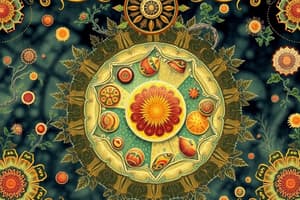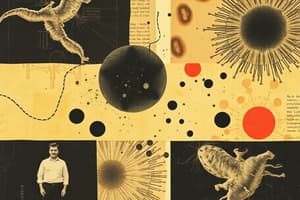Podcast
Questions and Answers
What was the significance of Pasteur's curved-neck flask design?
What was the significance of Pasteur's curved-neck flask design?
- It prevented microorganisms from entering the broth. (correct)
- It facilitated gas exchange with other liquids.
- It allowed the broth to be boiled effectively.
- It increased the temperature of the broth.
What would happen if the neck of Pasteur's flask was broken?
What would happen if the neck of Pasteur's flask was broken?
- Air would escape and create a vacuum.
- Microorganisms would quickly contaminate the broth. (correct)
- The broth would evaporate faster.
- The broth would remain uncontaminated.
What does the cell theory imply about multicellular organisms?
What does the cell theory imply about multicellular organisms?
- They do not share cells with other organisms.
- Each cell type has an independent ancestry.
- They originate from multiple fertilized eggs.
- All their cells are derived from a single special cell. (correct)
According to Darwin and Wallace, what is a common ancestor?
According to Darwin and Wallace, what is a common ancestor?
How do organisms with advantageous traits affect future generations?
How do organisms with advantageous traits affect future generations?
What principle explains the gradual changes in species over generations?
What principle explains the gradual changes in species over generations?
Why is variation among individuals important for evolution?
Why is variation among individuals important for evolution?
What is the term used to describe the ability of an individual to produce offspring?
What is the term used to describe the ability of an individual to produce offspring?
Who was the first scientist to observe single-celled organisms?
Who was the first scientist to observe single-celled organisms?
What does the Cell Theory state?
What does the Cell Theory state?
What type of flasks did Louis Pasteur use in his experiment to demonstrate that microorganisms do not arise spontaneously?
What type of flasks did Louis Pasteur use in his experiment to demonstrate that microorganisms do not arise spontaneously?
What was the result of Louis Pasteur's experiment involving the swan-neck flasks?
What was the result of Louis Pasteur's experiment involving the swan-neck flasks?
Which statement is true regarding the origins of new cells?
Which statement is true regarding the origins of new cells?
Which of the following did NOT contribute to the formulation of the Cell Theory?
Which of the following did NOT contribute to the formulation of the Cell Theory?
What is the primary misconception regarding spontaneous generation addressed by Pasteur's experiment?
What is the primary misconception regarding spontaneous generation addressed by Pasteur's experiment?
Why is Louis Pasteur's experiment significant in the study of microbiology?
Why is Louis Pasteur's experiment significant in the study of microbiology?
Flashcards are hidden until you start studying
Study Notes
Early Cell Discoveries
- Robert Hooke first observed plant cells in cork using a microscope in 1665.
- Anton van Leeuwenhoek improved microscope design and discovered single-celled organisms.
Understanding Cells
- Cells serve as the fundamental units that constitute all living organisms.
- They are commonly referred to as the building blocks of life.
Cell Theory
- All living things are composed of cells.
- Cells are the basic structural and functional units of life.
- New cells are produced from existing cells, a principle established by Matthias Schleiden, Theodor Schwann, and Rudolf Virchow in the 1800s.
Louis Pasteur's Experiment
- Pasteur aimed to disprove the theory of spontaneous generation, which claimed that microorganisms arise from non-living matter.
- Experiment utilized flasks with nutrient broth; straight necks allowed for direct air contact, while swan-neck flasks prevented dust contamination.
- Outcome: Straight-neck flasks became cloudy due to microorganisms, while swan-neck flasks remained clear unless contaminated.
Significance of Pasteur's Findings
- Demonstrated that microorganisms originate from other microorganisms rather than spontaneously from non-living materials.
- Contributed significantly to the understanding of germ theory and disease causation.
Investigation of Spontaneous Generation
- In 1861, scientists investigated the possibility of life emerging from inert materials.
- Pasteur's swan-neck flask design effectively filtered out dust while allowing air in, keeping the broth free of microorganisms.
- When the neck was broken, organisms from the air contaminated the broth, affirming that life comes from existing life.
Implications of Cell Theory
- In single-celled organisms, like bacteria, each cell is connected through a common ancestor, replicating with minor variations.
- Multicellular organisms, including humans and plants, derive all cells from a fertilized egg, illustrating cellular interconnection and evolution over time.
The Theory of Evolution by Natural Selection
- Darwin and Wallace proposed that all living beings share common ancestors if traced back far enough.
- Species undergo gradual changes and develop new traits over generations, facilitating adaptation to environments.
Key Concepts of Evolution
- Evolution entails gradual changes within species over time rather than sudden shifts.
- Natural selection favors organisms with advantageous traits that enhance their survival and reproductive success.
- Variation within populations is essential for providing the necessary traits for evolutionary change.
- Darwin elaborated on these theories in his seminal work "On the Origin of Species" published in 1859.
Key Terms
- Evolution: The process through which species change over time and share common ancestry.
- Natural Selection: The mechanism by which evolution occurs, favoring traits suited for the environment.
- Fitness: An individual's capability to produce offspring relative to others in the population.
- Adaptation: A trait that enhances an individual's fitness in a specific environment.
Studying That Suits You
Use AI to generate personalized quizzes and flashcards to suit your learning preferences.




